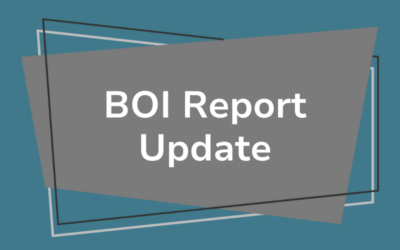Many small business owners choose to operate their companies under the LLC business structure. They do so with good reason! The LLC offers liability protection to its owners (members), tax flexibility, and compliance simplicity. However, that tax flexibility may cause some confusion for entrepreneurs. One of the tax-related topics that people often ask about is if LLC members have to pay self-employment tax. In this article, I’m going to cover that question, along with many others related to the subject.
FAQs About LLCs and Self-Employment Tax
Is Self-Employment Tax the Same as Income Tax?
Self-employment tax is a federal tax levied on a self-employed person’s income, but it is not the same as federal income tax. It is a separate and additional 15.3% tax that some business owners (sole proprietors, general partners, and most LLC members) must pay. The self-employment tax consists of a 12.4% Social Security tax and a 2.9% Medicare tax.
Why Do LLC Members Have to Pay Self-Employment Tax?
Self-employment tax ensures that self-employed people pay Social Security and Medicare taxes that would otherwise be withheld by an employer through payroll taxes.
When someone works for an employer, half of the Social Security and Medicare taxes (known as FICA tax) are withheld from their wages. The employer must submit that money and pay the other half of the FICA tax to the IRS.
FICA doesn’t apply to Limited Liability Company owners, though. For tax purposes, an LLC is considered the same tax entity as its owners, and all tax obligations flow through to the individual members. LLC members are not considered employees and do not receive paychecks from which FICA is withheld. They are considered self-employed and required to pay Social Security and Medicare taxes equal to what is collected from businesses and their employees. So, the individual owners rather than the LLC are responsible for paying all of the 15.3% self-employment tax. Half of the self-employment tax paid by self-employed individuals can be deducted as a business expense.
If an LLC Member is Inactive in a Business, is He Subject to Self-Employment Tax?
No. Self-employment tax only applies to active members.
Is There a Limit on How Much Self-Employment Tax You Have to Pay?
Yes and no. For 2022, only the first $177,000 of an LLC member’s net earnings are subject to the Social Security portion of self-employment tax.
The 2.9% Medicare portion of self-employment tax applies to all of an individual taxpayer’s net earnings. In fact, if individuals’ taxable income exceeds a certain threshold, they must pay an additional 0.9% Medicare Tax. The thresholds vary by filing status:
- Married filing jointly – $250,000
- Single – $200,000
Is Self-employment Tax Handled the Same for Single-Member LLCs and Multi-Member LLCs?
The Single-Member LLC and Self-Employment Tax – A single-member LLC is classified as a disregarded entity, and the IRS treats them the same as a sole proprietorship. In other words, the company itself doesn’t pay income-related taxes. Owners of a single-member LLC are not employees and instead must pay self-employment tax on their earnings from the business.
Multi-member LLCs and Self-Employment Taxes – Generally, the IRS treats multi-member LLCs as partnerships. Each member of a multi-member LLCs must pay self-employment taxes on their share of the LLC’s profits. Even if LLC members leave some of their distributive share in the business, they must pay self-employment tax on their entire share of the profits.
Can LLC Members Avoid or Reduce Self-Employment Taxes?
LLC owners choose to lessen their individual self-employment tax burden by electing to have the LLC treated as a corporation for tax purposes.
Classification as an S Corporation (under Subchapter S of the Internal Revenue Code) is what most LLCs select when aiming to minimize their owners’ self-employment taxes. S Corporations remain a pass-through tax entity, so profits and losses of the business flow to the individual owners just as with a disregarded entity LLC. However, LLC members who work in the business are considered employees. As such, they only pay Social Security and Medicare taxes on the wages and salaries they get from the business. Individuals pay half of the FICA taxes, and the business pays the other half.
You might be wondering how this can save money since, ultimately, they’re paying the same percentage in FICA taxes as they would for self-employment taxes. Well, after the owners who are set up as employees are paid a reasonable wage, any profits given to them as distributions are not subject to Social Security and Medicare taxes. They must still pay income tax on those profits but not FICA or self-employment tax.
Alternatively, an LLC can choose to be taxed as a C Corporation (taxed under Subchapter C of the Internal Revenue Code). A C Corp must report and pay income tax on its profits. Business income does not flow through to owners’ individual tax returns as it does with a disregarded entity LLC or an S Corporation. The C Corp tax classification can reduce the business owners’ individual Social Security and Medicare tax burden in the same way an S Corp does. Business owners (shareholders) who work in the business are set up on payroll and pay half of FICA taxes due on their wages and salaries. However, business owners should consider how the double taxation that occurs with C Corporations will affect the overall tax situation.
Read More About Payroll: What is Payroll?
What is double taxation? The business’s profits are first taxed on the corporation (at the applicable corporate tax rates). Then, if the corporation distributes profits as dividends to shareholders, the dividends get taxed again on each shareholder’s personal tax statement at the applicable individual tax rates.
LLCs that want to be taxed as a corporation must file additional forms with the IRS:
- C Corporation – IRS Form 8832 for Entity Classification Election
- S Corporation – IRS Form 2553 for Election by a Small Business Corporation
I strongly advise that business owners talk with both an attorney and tax professional for guidance in selecting the most favorable business structure and tax election for their situation.
Is There Any LLC Income That Is Exempt from Self-Employment Tax?
Self-employment tax does not get levied on passive income that LLC owners earn.
The IRS recognizes two kinds of passive business activity:
- Trade or business activities in which you don’t materially participate during the year.
- Rental activities, even if you do not materially participate in them, unless you’re a real estate professional.
Material Participation
The IRS considers all of the following activities material participation:
- The individual participated in the activity for more than 500 hours during the tax year.
- The individual’s participation was substantially all of the participation in the activity of all individuals for the tax year. This includes the participation of individuals who didn’t own any interest in the activity.
- The individual participated in the activity for more than 100 hours during the tax year and participated at least as much as other individuals (including those who didn’t own an interest in the activity) for the year.
- The individual materially participated in the activity (other than by meeting this fifth criterium) for any five (consecutive or not) of the last ten preceding tax years.
- The individual participated in the activity regularly, continuously, and substantially during the year.
Generally, LLC members are hands-on in running their businesses, so their degree of involvement in activities is almost always considered material participation.
Rental Activities
This second type of passive income is more common with LLCs. People sometimes use the LLC business structure, which shields them from personal liability risks, for rental properties that they own. Rental income is not subject to self-employment tax. (Note that the income does have to be reported on the individual’s income tax return.)
How Do LLC Members Pay Self-Employment Tax?
LLC owners pay self-employment taxes by making estimated tax payments quarterly throughout the year (in April, June, September, and January). Those estimated tax payments include both federal income tax and self-employment tax. It can be helpful for LLC members to talk with an accountant or tax advisor at the start of the current tax year to estimate how much tax they will owe. Then, they can calculate how much they should pay on a quarterly basis. The actual payments they make each quarter may need to be adjusted if the LLC’s profits are significantly lower or higher than anticipated.
When LLC owners file their Form 1040 income tax return, they submit Schedule SE (Self-Employment Tax with it. Schedule SE is used to calculate and report what the individual owed in self-employment taxes. LLC members will need to use some of the information from their Schedule C (or Schedule K-1 if a multi-member LLC), which also gets filed with Form 1040, when completing Schedule SE.
Next Steps
I recommend that LLC members talk with an accountant or tax professional. It’s helpful to gain insight from someone who understands all the ins and outs of self-employment tax and all of the other taxes (federal, state, and local) that LLCs must pay. Staying current with tax payments is one of the many things necessary to keep a business in good standing with the IRS, Secretary of State Office, and local government.
And remember, CorpNet is always here to help entrepreneurs fulfill their business formation and compliance requirements. We prepare and file business registration paperwork with the state, business entity conversion paperwork, Forms 8832 and 2553 to elect taxation as an S Corporation or C Corporation, EIN applications, state sales tax license registrations, and much more.
Need Help Registering Your LLC?
Registering your new Limited Liability Company with CorpNet is quick and your satisfaction is guaranteed. Whether you’re forming a new LLC or converting an existing business to an LLC, we can handle all the paperwork for you.





